#argot
Explore tagged Tumblr posts
Text
you can tell most people tell jokes about the digressions without reading the book because they complain about Waterloo, which has battles and plot-essential character development and obvious themes, and not Argot, which has , uh this:
“My shooting-iron,” the cavalry-man who says: “My turkey-cock,” the fencing-master who says: “Tierce, quarte, break,” the printer who says: “My shooting-stick and galley,”—all, printer, fencing-master, cavalry dragoon, infantry-man, phrenologist, huntsman, philosopher, comedian, playwright, sheriff, gambler, stock-broker, and merchant, speak slang. The painter who says: “My grinder,” the notary who says: “My Skip-the-Gutter,” the hairdresser who says: “My mealyback,” the cobbler who says: “My cub,” talks slang. Strictly speaking, if one absolutely insists on the point, all the different fashions of saying the right and the left, the sailor’s port and starboard, the scene-shifter’s court-side, and garden-side, the beadle’s Gospel-side and Epistle-side, are slang. There is the slang of the affected lady as well as of the précieuses. The Hotel Rambouillet nearly adjoins the Cour des Miracles. There is a slang of duchesses, witness this phrase contained in a love-letter from a very great lady and a very pretty woman of the Restoration: “You will find in this gossip a fultitude of reasons why I should libertize.” Diplomatic ciphers are slang; the pontifical chancellery by using 26 for Rome, grkztntgzyal for despatch, and abfxustgrnogrkzu tu XI. for the Duc de Modena, speaks slang. The physicians of the Middle Ages who, for carrot, radish, and turnip, said Opoponach, perfroschinum, reptitalmus, dracatholicum, angelorum, postmegorum, talked slang. The sugar-manufacturer who says: “Loaf, clarified, lumps, bastard, common, burnt,”—this honest manufacturer talks slang. A certain school of criticism twenty years ago, which used to say: “Half of the works of Shakespeare consists of plays upon words and puns,”—talked slang.
yeah it's about slang
the whole chapter
55 notes
·
View notes
Text

350 notes
·
View notes
Text
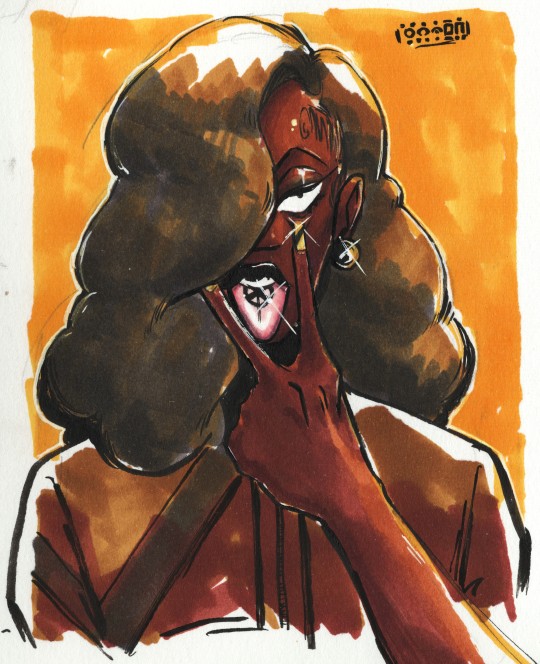
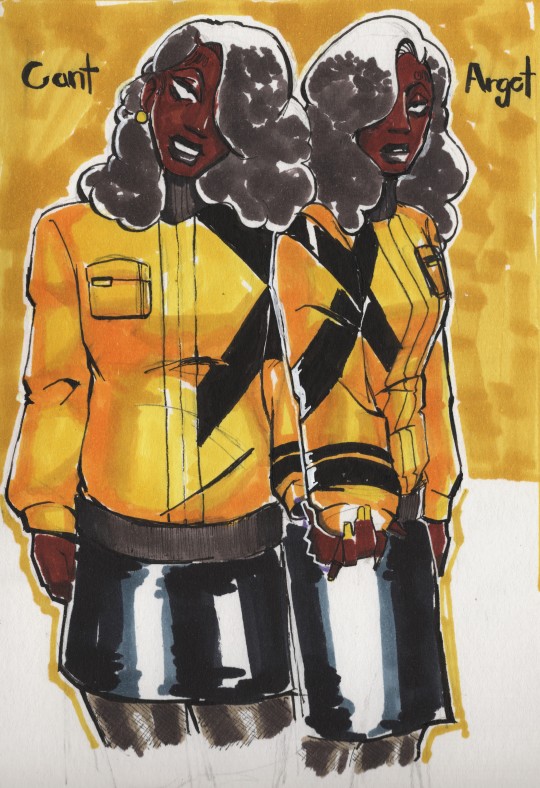
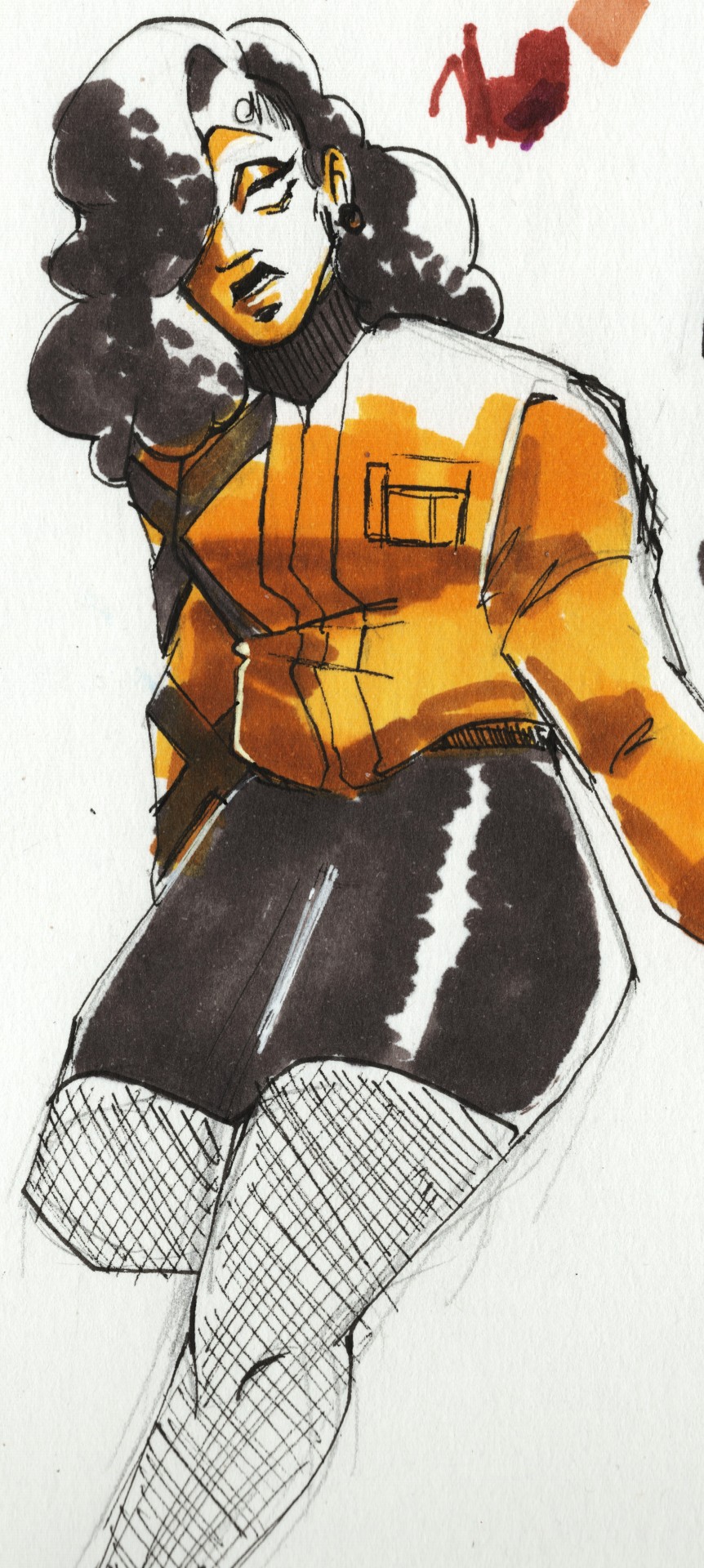
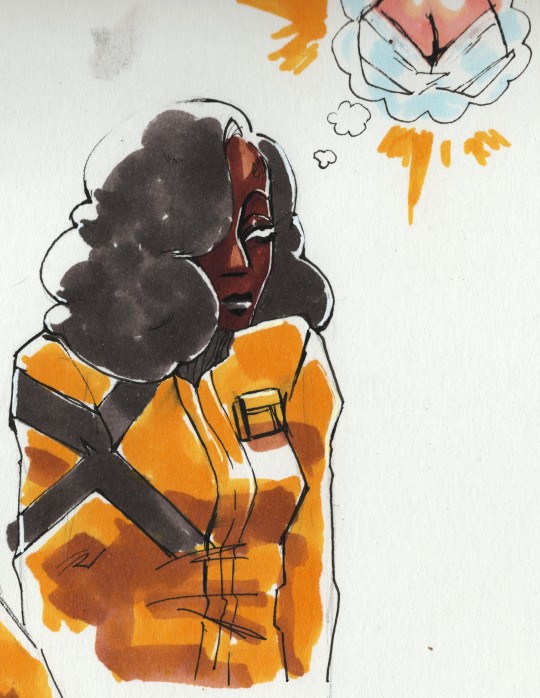
my mutant oc argot and her robot clone/autonomous body cant (formerly known as robot argot) argot is a telepath with forced empathetic sensory experiences who struggles with defining her own emotions and displaying them in a matter that's considered correct. cant was her solution for this, a remote decoy with her memories, linked to her brain that can perform socially where she couldn't. the two are slowly starting to drift into different people though
12 notes
·
View notes
Text





J'essaie de rattraper mon retour : ces photos datent de fin juillet, lors de la visite de mon ami breton, Christian (ici en ange) !
Marseille. Le quartier du Panier, vers la Place des Treize Cantons, où se trouve un boulodrome intérieur. On y apprend aussi un peu de langue marseillaise (chaler quelqu'un c'est le prendre sur son vélo) !
#marseille#christian#le panier#place des 13 cantons#place des treize cantons#tag#art urbain#graffiti#street art#boules#jeu de boules#pétanque#boulodrome#langage#marseillais#argot marseillais#argot#chaler
6 notes
·
View notes
Text
Zahma
Fini la zone en chien au parc À poireauter après Hélène ; Les schmitts ont chourrav nos sirènes, On taxe une nuigrav aux narcs.
Sûr, j’ai d’autres plans à mon arc Pour mes cravings au kérosène : De la rouille en drep brésilienne Amazonée express du dark.
La salle de shoot ? C’est walou, Mais j’irai guédra les modoux Si j’ai le S qui vient khalasse.
Quand j’ai gobé sec deux paras De sken, je refonds dans la masse, À ramper dans la course aux rats.
#french poetry#poème court#poésie#sonnet#poesie#poème français#poètes sur tumblr#écrire#nanowrimo 2024#napowrimo#octosyllabe#addiction#argot
3 notes
·
View notes
Text
The argot digression is here!
Hugo does not begin with a defense of slang itself; it’s almost the opposite, as he likens it to “robbery.” What he does seek to defend is its use in literature. Adopting a quasi-scientific defense, he claims that argot should be part of literature to study it as part of society: if argot exists in the lowest parts of society, then how can that aspect be examined without its language? It’s an argument that presupposes distance from that language, reassuring critics of argot that its use isn’t an endorsement, but rather a necessity. Based on the Donougher translation, Hugo also included extensive footnotes on the meaning of these words, so his use of argot was accessible to members of his audience unfamiliar with it (and it seems like an interesting way to learn about 19th-century French if you know the language!).
Hugo’s description of a more expansive slang is funny, mainly because of the flowery language of the academician. However, he rejects this expansiveness, claiming that slang must be the “language of misery.” In that sense, slang is negative, a representation of rage against a cruel social order that morphs into crime (not portrayed sympathetically here). Yet that’s precisely why it must be included: it’s the language of what this book (with “miserable” in its title) seeks to explore.
The theatrical language for crime returns, but for language itself as argot takes the stage. The dehumanization of those speaking argot is disturbing, although it’s proximity is an interesting point. As Hugo argued, it’s difficult to separate different aspects of history, and here, that’s because it’s difficult to separate classes. The poor who speak argot are right outside the buildings of the rich. His emphasis on literacy feels mixed for the same reason. On the one hand, literacy is so valuable! Everyone being able to read in a print-heavy society is a great way of keeping literacy from being a major tool of deception! On the other, his comments about argot raise the issue of standardization, which would limit the diversity of the language.
21 notes
·
View notes
Text
youtube
argot -- from worship to tyranny
4 notes
·
View notes
Text
35 French Gay Slang Words You Need to Know - Talk in French
8 notes
·
View notes
Text
Diccionario mundifinista parte 60:
Adivinar: Saber lo que dice esta definición antes de leerla.
Alcohol: En algunos casos suero de la verdad.
Algoritmo: Nuevo demonio del infierno.
Alma: En el caso del ser humano, se compone de dos cosas: redes sociales y dispositivo móvil.
Anticuarix: Persona que disfruta saliendo con gente 15 años más vieja o más.
Antídoto: Whisky. // Amor. // Amistad. // Empatía. // Informarse. // Aprender. // Whisky.
Argot: Lenguaje en el que hablan los políticos cuando responden una pregunta hablando sin decir nunca nada.
Autopsia: (clínica o forense) Recordar nuestra última relación para determinar las causas de por qué terminó.
Bestiario: Lista de tus ex’s.
Blasfemia: Ponerle hielo a mi vaso con Jack Daniel’s.
Borrachx: Mi compatriota.
Certeza: No dudar de que tengo dudas.
Cocinerx: Chef pero con humildad.
Edad: Avanza aunque en realidad es una cuenta regresiva.
Fantasma: Inmigrante ilegal espiritual, dios/Trump le prohíbe la entrada a sus reinos hasta que no tenga todos sus papeles en regla.
Florencia: (anagrama de) Necrófila con las letras entreveradas.
Gastronomía: Cocinería.
Ignorancia: Estado existencial habitual de quienes más opinan sin que nadie les pregunte.
Injuria: Ver definición de “Blasfemia” página 666 de la presente edición.
Lluvia: Mi canción de cuna favorita.
Machista: (entre otras cosas) Idiota que usa conceptos medievales como si fueran tecnología de punta.
Matrimonio: El nombre que le pusieron al amor cuando intentaron civilizarlo.
Muerte: La hora de devolver lo que te prestó el futuro.
Paraíso: Lugar donde la alegría se convierte en felicidad y encima perdura.
Pelotudo: Uno de los jinetes del apocalipsis.
Rico: Acaparador de recursos.
Tiranía: Ecosistema laboral habitual.

Acostumbradoalfindelmundolandia: linktr.ee/acostumbradoalfindelmundo
#acostumbrado al fin del mundo#diccionario#diccionario mundifinista#adivinar#alcohol#algoritmo#alma#anticuarix#antidoto#argot#autopsia#bestiario#blasfemia#borrachx#certeza#cocinerx#edad#fantasma#florencia#gastronomia#ignorancia#injuria#lluvia#machista#matrimonio#muerte#paraiso#pelotudo#rico#tirania
1 note
·
View note
Text
L'argent dans tous ses états : un voyage à travers l'argot français
Fric, thune, maille, pognon...Plongez dans le langage familier de l'argent avec nos cours de français axés sur l'argot. Une approche unique pour maîtriser la langue !
L’argent, “nerf de la guerre”, objet de toutes les convoitises, a beaucoup inspiré l’argot et donné lieu à une myriade d’expressions drôles et parfois cryptiques. Véritable reflet de la culture populaire, ces termes hauts en couleur témoignent de l’importance de l’argent dans notre société et de la fascination qu’il exerce. Embarquons pour un voyage linguistique au cœur de l’argot français, à la…
0 notes
Text
Argot drives me NUTS because it's got some absolutely horrible Hugo Takes but then it also has bits like this
Are you what is called a happy man? Well! you are sad every day. Each day has its own great grief or its little care. Yesterday you were trembling for a health that is dear to you, to-day you fear for your own; to-morrow it will be anxiety about money, the day after to-morrow the diatribe of a slanderer, the day after that, the misfortune of some friend; then the prevailing weather, then something that has been broken or lost, then a pleasure with which your conscience and your vertebral column reproach you; again, the course of public affairs. This without reckoning in the pains of the heart. And so it goes on. One cloud is dispelled, another forms. There is hardly one day out of a hundred which is wholly joyous and sunny. And you belong to that small class who are happy! As for the rest of mankind, stagnating night rests upon them.
and
When you shall have learned to know, and to love, you will still suffer. The day is born in tears. The luminous weep, if only over those in darkness.
Banger! and then it's also Hugo being incredibly dramatic with Bad 19C Progressive Opinions About Slang
What is slang? It is at one and the same time, a nation and a dialect; it is theft in its two kinds; people and language.
it's slang, Hugo. Calm down.
#Hugo: every group and subculture has slang it's fiiiine. Interesting even!#Me: hells yeah#Hugo: but lower class slang...is Evil#Me: wait what#ARGOT#Argot my nemesis#LM 4.7.1#Les Mis Letters
43 notes
·
View notes
Text
🎶yækoyu aruti bubiayututayfufulul 🎶
Not me learning a song in tut🥳🥳
Pupirutayodudddd 😛❗️
1 note
·
View note
Text
"Automobile thieves are closely allied with bandits, and the lingoes of the two are closely interwoven. Many of the terms have ancient origins, but later usage has given them special, and often different, significances. Laying out the route of escape before consummating a robbery comes under casing. Yet to case also covers the preliminary work of watching the employees of a bank (or other mark.) Following a pay-roll, watching a jewelry store, tailing (not trailing, so often used erroneously) a jewelry salesman, or a mail-truck-all these activities come under the heading of casing. "Give it a case." "Has it been cased?" "Casing a mark without getting a rank" is the most difficult part of a robbery. Rooting implies that several men are going out on robbery bent. "Come on! Let's root against that jug to-day." "Larry got shot rooting single- handed." Root belongs to the old yeggs, but during the war there was very little rough stealing in this country, and the term fell into disuse. Then along about 1919 or 1920 it started to come back, but as the property of the young bandits who first stole automobiles, and then rooted on some bank, pay-roll, or mail-truck.
To gat-up means to hold up a person or place with a gun. Gat indicates a revolver or rod as distinguished from a long rod, a rifle. Its origin comes from this: Many cats once worked in the harvest fields of the Middle West. Cats are itinerant workers, the fringe of the hobo, bum, and yegg outfits, who beat their way on freight-trains. Traveling from the fields after the harvest, many of them often crowded into one box-car. Into this car came men intent on harvesting the harvesters. With drawn guns these men, usually two in number, would force the cats to surrender their earnings and then order them to leave the car by leaping from the side door. "There wuz cats strung out for a mile along that drag." The term catting up was applied to this pastime by the profession. Those employed in it were known as cat-up men. Soon cat was corrupted to gat. The latter has been derived, by some authorities, from
Gatling (gun), but probably erroneously. Rap is very prevalent. A rap used to be a definite charge placed against a man. The man might be either in jail or hunted as a fugitive. "Naw, he can't show-up around Minnie [Minneapolis] on account of that jug rap he's wanted for." A rapper was the main witness against a man. "If we could only pull the rapper off, then they wouldn't have no beef against him." But lately rap means any sort of betrayal or indiscretion. "Aw don't rap to that guy; he's wrong." "Why, I been rapping to him for years -I didn't know he's turned queer!" Rap and tumble are to-day synonyms: "I rapped to him and he didn't give me a tumble." Formerly tumble was akin to fall, to get a "jolt in the stir."
But for brevity and terseness I believe the following is worthy of a high award. The prison chaplain had inquired of a burglar the cause of his predicament. The answer is a prison classic: "I was prowling a private, an' I got a rumble and a rank, zowie! I'm ditched for fifteen flat, an' on a bum beef!" A bum beef, in the patois of the profes- sion, means that the gentleman was innocent.
- Ernest Booth, "The Language of the Underworld," in Joseph Lewis French, ed., Gray Shadows. New York: The Century Co., 1931. p. 164-166
#vagabonds#vagrants#hobos#ernest booth#slang#argot#joseph lewis french#criminal slang#history of slang#yeggs#prisoner autobiography#reading 2024#research quote#history of crime and punishment#car thieves#car theft#criminal underworld
1 note
·
View note
Text
Ch. B., « Julien Blanc », in « Dictionnaire des contemporains », Le Crapouillot, n°8, janvier 1950, p.29
https://julienblancromancier.wordpress.com/articles-temoignages/
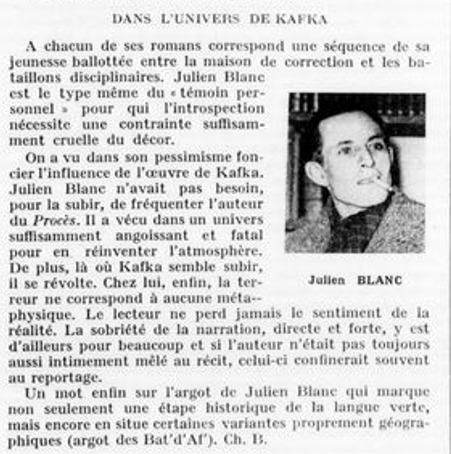
View On WordPress
0 notes
Photo
Understandably, Top Cat has some acquaintenance with the New York argot and patois.

~ The New Yorker, September 23, 1939
#hanna barbera#advertising headcannon#kitschy#language#new york#patois#argot#cant#New Yorkese#top cat#hannabarberaforever
227 notes
·
View notes
Text
I’m still uncomfortable with Hugo’s way of describing argot, but I actually like the comparison to a prison brand being made visible. The discomfort is placed with the viewer, who is confronted with the reality of the misery present in society and is repelled. But that reaction is on them, not the argot speaker.
Overall, this will be brief. Unfortunately, I don’t know a lot of French – much less 19th-century French – so a lot of this goes over my head. Seeing the overlap between languages is fun, though! And while I’m skeptical that the addition of syllables to the end of words was just to hide their meaning as Hugo claims, it was fun to read about! And it makes sense to mention in a digression so closely intertwined with Patron Minette’s escape from prison through argot.
It’s notable that an example for the origin of slang is from prisoners waiting to be sent to Toulon: prisoners like Valjean. Hugo’s overall condescension towards argot is frustrating, but he’s also sympathetic for his time. He mentioned before that there was a lot of backlash to the use of slang in his previous work (Le Dernier Jour d’un Condamné), so for him to not only defend argot in fiction but indirectly link it to his protagonist is significant. His imagery of a “savior” is awful, though, implying that argot users (the lower classes, especially those with ties to crime) need a man (like, say, Hugo) to “rescue” them from their “corrupt” language. It’s uncomfortably close to “civilizing” rhetoric.
22 notes
·
View notes